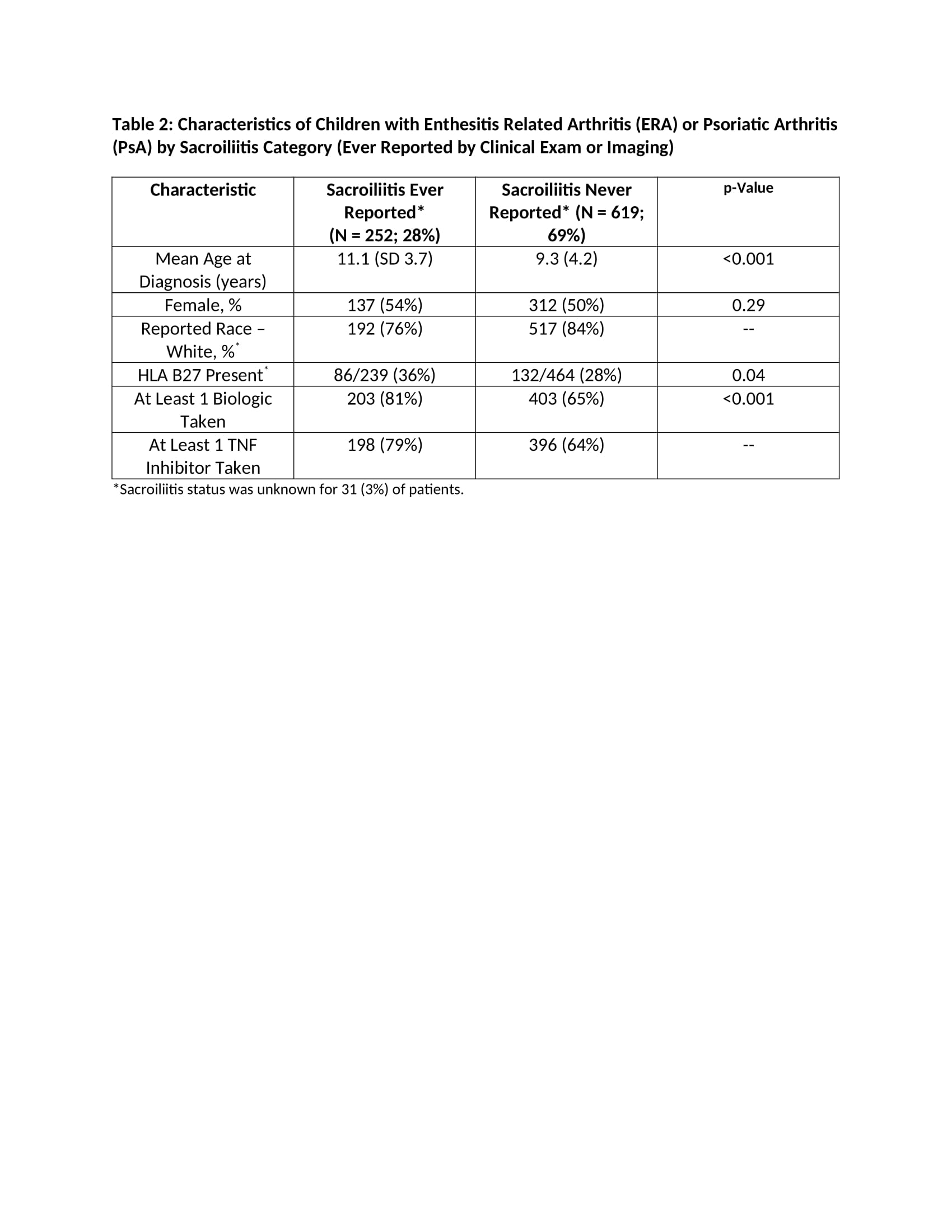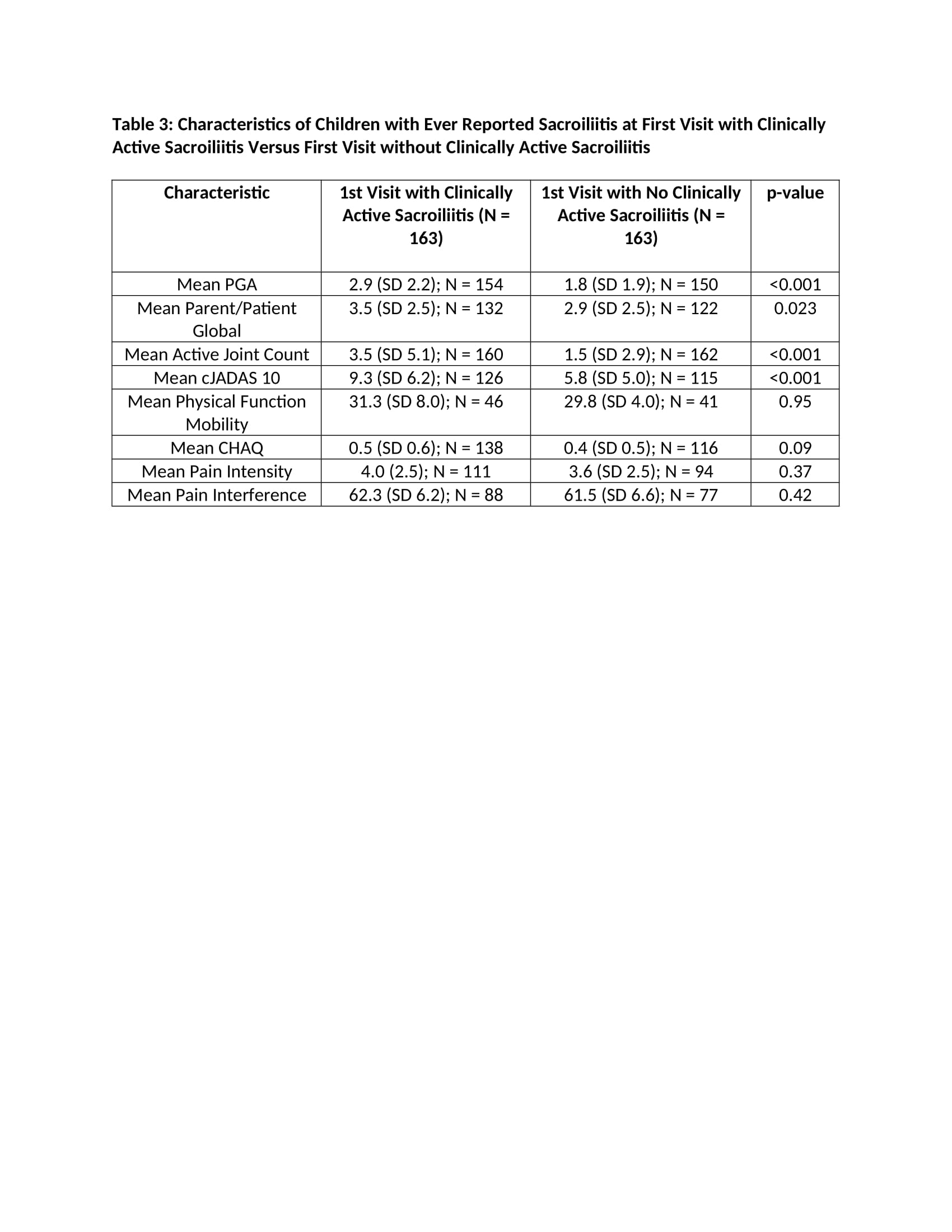Session Information
The 2020 Pediatric Rheumatology Symposium, originally scheduled for April 29 – May 2, was postponed due to COVID-19; therefore, abstracts were not presented as scheduled.
Date: Saturday, May 2, 2020
Title: Poster Session 3
Session Type: ACR Abstract Session
Session Time: 4:15PM-5:15PM
Background/Purpose: To describe characteristics of children with enthesitis-related arthritis (ERA) and juvenile psoriatic arthritis (JPsA) enrolled in the Childhood Arthritis and Rheumatology Research Alliance (CARRA) Registry.
Methods: All children with ERA and JPsA were identified. Demographics, clinical characteristics, and treatments were described. Those with and without sacroiliitis were compared. In those with sacroiliitis, the first visit with clinically active sacroiliitis was compared to the first visit without.
Results: Nine hundred two children with ERA or JPsA were identified. Children with ERA were older at diagnosis (10.8 vs. 8.2 years) and more likely male (56% vs. 38%). Polyarticular involvement was reported in 57% and 72% of those with ERA and JPsA. Sacroiliitis was reported in 40% and 12% of those with ERA and JPsA. HLA-B27 was positive in 38% and 12% of those with ERA and JPsA. At least one biologic was taken by 72% and 64% of those with ERA and JPsA.
Twenty-eight percent of the children had sacroiliitis (diagnosed clinically and/or by imaging). Of these, 54% were female, 36% were HLA-B27 positive, and 81% took at least one biologic.
In children with sacroiliitis, the physician global, parent/patient global, active joint count, and cJADAS 10 were all significantly worse during the first visit with clinically active sacroiliitis versus the first visit without.
Conclusion: In the CARRA Registry, there are over 900 children with ERA or JPsA. There was high biologic use in this population, especially in those with sacroiliitis. Further, there was equal sex representation in those with sacroiliitis.
To cite this abstract in AMA style:
Rumsey D, Lougee A, Matsouaka R, Collier D, Schanberg L, Schenfeld J, Shiff N, Stoll M, Stryker S, Weiss P, Beukelman T. Juvenile Spondyloarthritis in the Childhood Arthritis and Rheumatology Research Alliance (CARRA) Registry: High Biologic Use, Low Prevalence of HLA-B27, and Equal Sex Representation in Those with Sacroiliitis [abstract]. Arthritis Rheumatol. 2020; 72 (suppl 4). https://acrabstracts.org/abstract/juvenile-spondyloarthritis-in-the-childhood-arthritis-and-rheumatology-research-alliance-carra-registry-high-biologic-use-low-prevalence-of-hla-b27-and-equal-sex-representation-in-those-with-sacr-2/. Accessed .« Back to 2020 Pediatric Rheumatology Symposium
ACR Meeting Abstracts - https://acrabstracts.org/abstract/juvenile-spondyloarthritis-in-the-childhood-arthritis-and-rheumatology-research-alliance-carra-registry-high-biologic-use-low-prevalence-of-hla-b27-and-equal-sex-representation-in-those-with-sacr-2/



